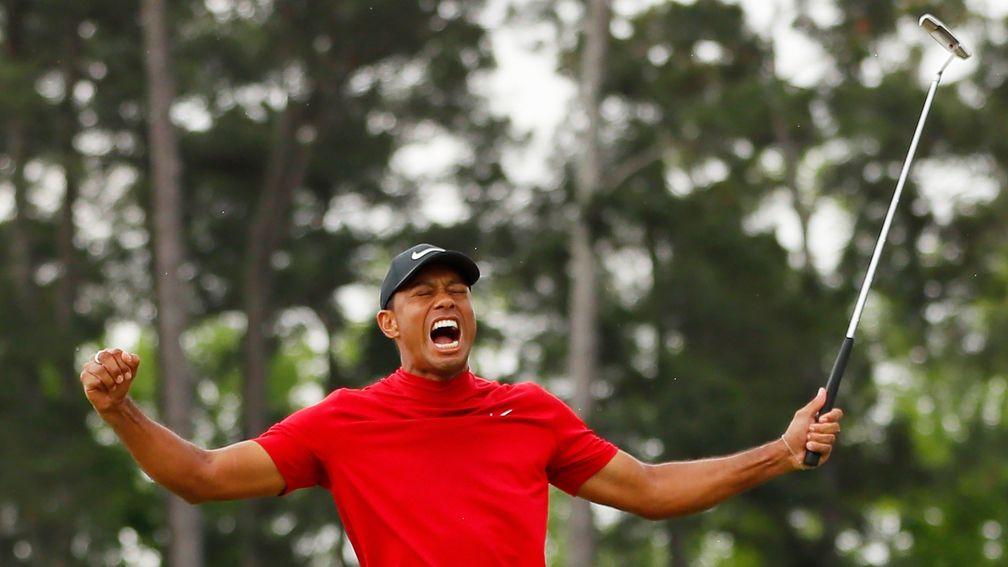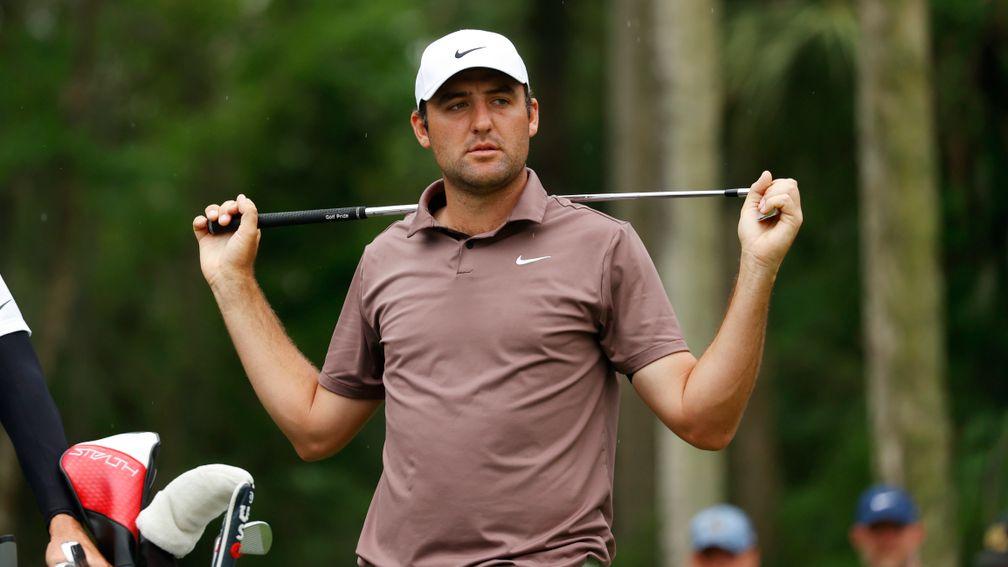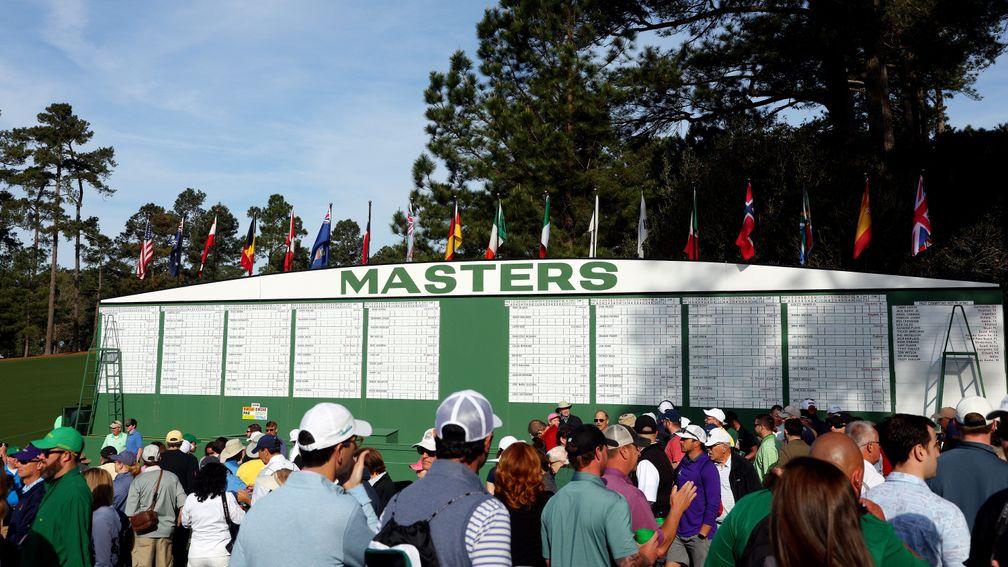The best online golf betting sites for each-way betting in 2024: Steve Palmer's expert guide

Punters who bet win-only on golf tournaments are a dying breed – for many reasons. For starters, they may well be lacking in stake money – because picking the winner of golf tournaments on a regular basis has become extremely difficult since Tiger Woods lost his edge many moons ago.
Woods was Mr Reliable – and in his pomp regularly started events 2-1 or shorter – but the next generation of golfers has failed to produce anybody anywhere close to Tiger in terms of winning ability. Backing Woods win-only made sense, but investing in lesser mortals demands a more sensible strategy.
For decades in my younger days, I was a win-only cavalier, bursting with bullishness and feeling that each-way bets were for negative, pessimistic, weak-willed individuals who were born losers. The tactic obviously paid off handsomely on occasions, but modern punters seeking more consistent returns should always be looking to back their golfers each-way.
The golfing landscape has never been more difficult, with enormous strength in depth on all tours. In the days of yore – when Tiger was rampant and there were 50 or so players teeing up with almost no hope of success – golf betting was more straightforward. These days, almost everybody in the field has some sort of chance, so the competitive nature of the tournaments makes each-way betting almost essential.
In the following section we look at some of the biggest layers in the golf betting market and how their each-way terms typically compare to others. It is common sense for punters to give themselves access to as many betting accounts as possible, so they have a full range of each-way terms and odds from which to attack.

Why you can trust RP Recommends
About the author
Multi-award-winning columnist Steve Palmer has been betting on golf since he was 18 years of age and has almost three decades of experience under his belt. Palmer joined the Racing Post Sport team in 2000, writing his first golf previews in 2001, and has been an immensely profitable tipster for his followers, suffering only three losing years in total heading into 2024.
RP Recommends: the must-have betting account for each-way golf betting
bet365
The range of each-way options with bet365 makes them a must-have for the serious golf punter. Their standard each-way terms are a quarter the odds, the first five places. But a fifth the odds, the first eight places are also available routinely for both main tours (DP World Tour and PGA Tour), along with a fifth the ten, a fifth the 12, and the least popular of all – a fifth the three.
The odds will differ depending on which each-way terms you use. Even a fifth the three is worth a second glance, with inflated odds offered to tempt punters into taking the inferior terms. And bet365 offer the best each-way terms for the 54-runner LIV Golf events – a quarter the odds, first five places. Most other firms go a fifth the odds, the first five.

The best online bookmakers for each-way golf betting in 2024
bet365
The most each-way options of any layer. Competitive prices. Often industry top price about players in their quarter the odds, first five market. Excellent website makes comparing their prices and terms straightforward.
Main pros:
- Market-leading prices
- Excellent place terms
- Great user experience
Betfair
Limited each-way terms. Typically only one option, but standard terms are usually competitive, especially for Majors. High-stake punters unwelcome.
Main pros:
- Fair each-way terms
- Great for the Majors
Betfred
Often offering top price in the industry, with standard each-way terms of a quarter the odds, first five. Alternative terms are available in the Pick Your Places section, with poorer odds for the best value terms.
Main pros:
- Standout prices
- Additional markets
Coral
The latest Coral policy seems to be offering the most each-way places, but asking customers to pay a high price, with a sixth the odds, the first ten places becoming the PGA Tour standard. No alternative terms.
Main pro:
- Most-each way places
Ladbrokes
Coral's sister company has been offering superb each-way terms, especially for PGA Tour events, with either a fifth the ten or a fifth the eight, depending on field size. Slightly shorter odds are understandable given quality of terms. No alternative terms.
Main pro:
- Excellent each-way terms
Paddy Power
Betfair's sister company typically mirrors their prices and terms. Like Betfair, usually hugely competitive for Majors.
Main pro:
- Big player for the Majors
Sky Bet
Typically competitive each-way terms, with alternatives for extra places at reduced odds.
Main pro:
- Competitive each-way terms
Unibet
Poor each-way terms, but competitive prices. Reluctant to accommodate high stakes.
Main pro:
- Competitive in terms of odds
William Hill
A balanced bookmaker, with middle-of-the-road offerings on prices, terms and stake levels. No alternative terms.
Main pro:
- Solid if unspectacular offering
Another leading bookmaker worth considering for golf betting
BoyleSports
A fifth the odds, the first eight places as standard, so industry-leading in consistently offering the best each-way terms. Short odds reflect that, though, and rarely top price about anyone. A range of Pick Your Place options available, but expect short odds. Reluctant to accommodate high stakes.
Main pro:
- Excellent each-way terms
Why each-way betting is the best strategy for serious punters
It is encouraging for punters that the PGA Tour seem to be keen on reducing field sizes, with the revamped 2024 Genesis Invitational, with 70 runners, a prime example. The smaller the field, the more opportunity the betting community has for success, but the standard field size on both tours remains 156.
If you were standing in a betting shop and a market appeared on the screens for a horse race that was about to start, featuring 156 runners, everyone in attendance would start laughing. Plenty would rightly be concerned about the safety of the horses, but only the insane would be pulling tenners from their pocket with view to having a wager on the winner. Why should a 156-runner golf tournament be treated any differently?
Of course, betting is a leisure pursuit – and a fun fiver at a big price on a golfer win-only will give you a pleasant interest – but serious punters seeking value investments should be leaning towards each-way options. Nearly all my outright golf betting these days is done each-way. I have not lost my confidence or commitment, but have developed an awareness that long-term profitability is found through each-way angles.
A punter's betting bank – the money one has specifically for punting – can quickly disappear through a win-only approach. A glance at the PGA Tour results in 2024 underlines how optimistic win-only punters are being.
Chris Kirk (best-price 200-1) won The Sentry – the PGA Tour's curtain-raiser. Grayson Murray (400-1) won the Sony Open the following week, then Nick Dunlap (300-1) won The American Express, Matthieu Pavon (125-1) won the Farmers Insurance Open, Wyndham Clark (80-1) won the Pebble Beach Pro-Am, then Nick Taylor (175-1) won the Phoenix Open. Anyone backing the market principals win-only has failed miserably in the early stages of 2024.

Even for short-price golfers, betting each-way is the best strategy. The 2024 Phoenix Open is a timely example. Scottie Scheffler was available at 5-1 in opening shows, with two firms offering each-way terms of a fifth the odds, the first ten places. The instinct of many punters is to back relatively short-price golfers win-only, but in this example the value of going the each-way route was starkly illustrated.
Scheffler led the tournament during the final round, but missed three short putts down the stretch, eventually finishing in third place. This was a bitter pill to swallow for Scheffler backers, of which I was one, but I did not lose any money on my investment. Having played at 5-1, with terms of a fifth the odds, ten places, the win element of my bet was funded by the place part. Scheffler comfortably placed and I could move on to future punting puzzles with stake money and assurance.
Even when a punter has decided he or she wants to play each-way rather than win-only, that is not the end of the decision-making. There are a multitude of each-way options in the marketplace, with varying terms, and differing prices.
The age-old conundrum for each-way golf punters is whether to take bigger odds and inferior place terms or shorter odds and superior place terms. For example, you may be able to get 18-1 on your selection with each-way terms of a quarter the odds, five places. Elsewhere, though, your player could be on offer at 14-1 with each-way terms of a fifth the odds, ten places.
These judgements always come down to personal preference. In my headstrong youth, I would target the bigger odds, expecting my player to win or come extremely close to doing so. As grey hairs have appeared on my increasingly weary head, the value of shorter odds and more places has become apparent.
There is obviously a balance to be struck – do not let bookmakers lure you in with their fancy each-way terms if they are offering miserable odds – but generally the better bets are those that provide the safety net of several places.
It is important to also note that access to lots of places is usually reserved only for pre-tournament punters. As soon as the events start, with markets switching to in-running prices, the place terms will change. If you want an each-way bet with lots of places, you must get it on before the tournament starts, as place terms get increasingly poor, worsening with every round. In-running odds are often excellent, but place terms never improve.
What do we mean by each-way betting and how does it work?
For example, if you had £10 each-way on a golfer at odds of 100-1, your total stake is £20 (£10 on the win part of the bet and £10 on the place part). Let us say for this example you have been given each-way terms of a quarter the odds, the first five places.
If your golfer wins the tournament, the return is £1,270. You won £1,000 (100x £10) from the win part of your bet and £250 from the place part, as a quarter of the 100-1 odds is 25-1. You also, of course, get your stake money (£20) back.
If your golfer finished in the top five without winning – and at least one shot ahead of the player or players who finished sixth – then your return is £260 (the place winnings and the place stake).
Dead-heat rules apply if more than the designated number of players finish in the places. If, in this example, your 100-1 shot tied for fifth place with three other players, then your return would be calculated at one-quarter (because yours is one of four players who has earned a share of the one remaining place) of your place stake (£2.50) at the full place odds (25-1), meaning a return of £65. The players in the top four earned their backers a 'full place', but the four players tied for the final place dead-heated, earning a 'partial place'.
Place returns often get diminished by dead-heats. In the above example, if your player finished tied for second place with six other players, your return would be calculated at four-sevenths (because yours is one of seven players who has earned a share of the four remaining places) of your stake (£5.71) at the full place odds (25-1), meaning a return of £148.46.

Conclusion
In the modern golfing era of deep fields and ultra-competitive events, my personal preference is to bet with terms of a fifth the odds, the first eight places. If I can get the same odds about my player while accessing a fifth the odds, the first ten places, I will obviously do that.
When punters are backing a big-price outsider, taking only five places is rarely a sensible idea. For example, I backed Ugo Coussaud in the 2024 Bahrain Championship. The Frenchman was 275-1 with bet365 with each-way terms of a quarter the odds, five places, but I opted for the fifth the odds, eight places market, in which he was a 200-1 chance.
Losing 75 points off your odds is a tough one to stomach for many punters, but I decided it was worth it to get eight places rather than just five. As things turned out, Coussaud finished 12th (I should have taken a fifth the 12 at even shorter odds!). As a rule of thumb, get as many places as possible for your most ambitious investments.
Each-way options get even better for Majors, where bookmakers are falling over themselves to attract new customers and achieve record-breaking turnover.
The Masters in April, for example, is usually the most attractive each-way betting heat of the whole year, with a small field of around 90 players, featuring several washed-up veterans and nervous Augusta debutants. Even though the field can be reduced to about 60 possible winners, bookmakers will offer enhanced each-way terms. Betfair Sportsbook were offering a fifth the odds, 12 places for their standard book for the 2023 Masters.
Punters should target the second week of April for their most enthusiastic each-way bets of the year.
RP Recommends: read the full series
- The best online bookmakers in 2024: what do the leading betting firms offer horse racing punters?
- The best online betting sites for each-way betting in 2024: which bookmakers are paying the most extra places this year?
- The best online betting sites for Lucky 15 horse racing bets in 2024: which leading bookmakers stand out and why?
- Best odds guaranteed in 2024: which firms offer the concession and from what time?
- Racing Post betting guide 2024: expert punting advice and bookmaker considerations
Commercial notice: This article contains affiliate links. Offers are handpicked and come from operators our experts have first-hand experience of. Opening an account via one of these links will earn revenue for the Racing Post, which will be used to continue producing our award-winning coverage of horseracing.
Published on 23 April 2024inRP Recommends
Last updated 11:00, 23 April 2024
- Racing Post betting guide 2024: expert punting advice and bookmaker considerations
- Best odds guaranteed in 2024: which firms offer the concession and from what time?
- The best online betting sites for Lucky 15 horse racing bets in 2024: which leading bookmakers stand out and why?
- The best online betting sites for each-way betting in 2024: which bookmakers are paying the most extra places this year?
- The best online bookmakers in 2024: what do the leading betting firms offer horse racing punters?
- Racing Post betting guide 2024: expert punting advice and bookmaker considerations
- Best odds guaranteed in 2024: which firms offer the concession and from what time?
- The best online betting sites for Lucky 15 horse racing bets in 2024: which leading bookmakers stand out and why?
- The best online betting sites for each-way betting in 2024: which bookmakers are paying the most extra places this year?
- The best online bookmakers in 2024: what do the leading betting firms offer horse racing punters?








